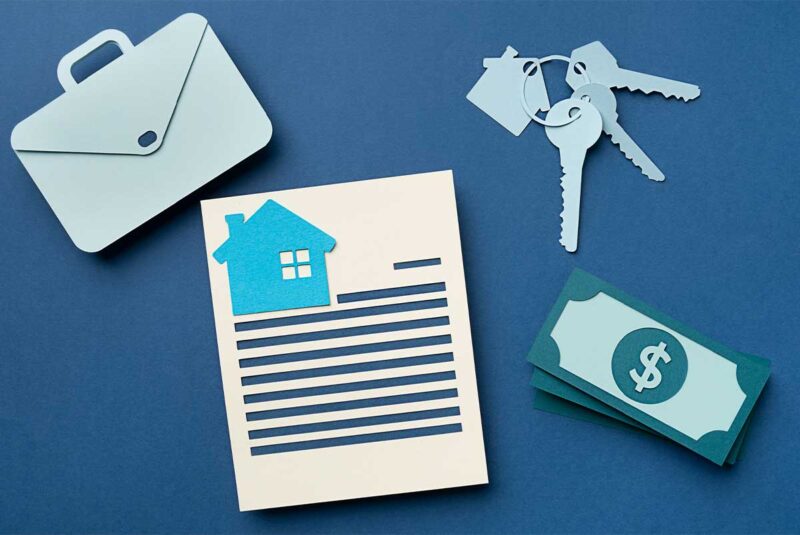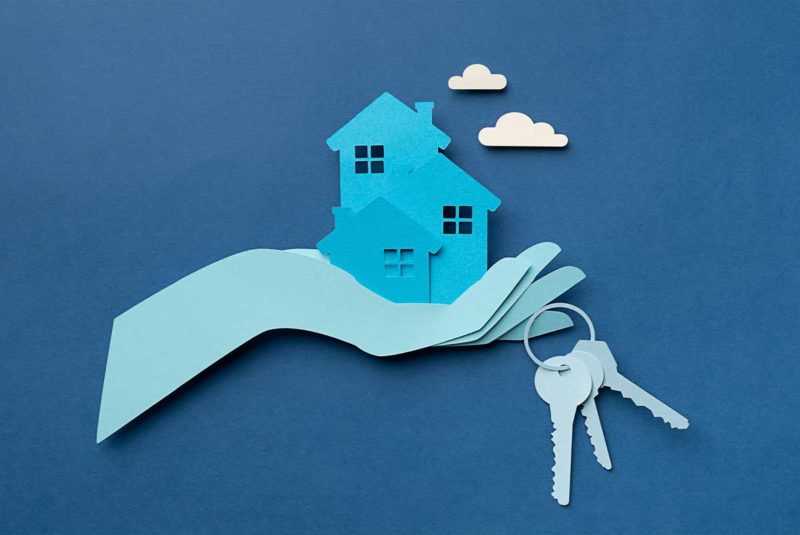Ready To Buy a Home?
Get Approved to Buy a Home
Rocket Mortgage® lets you get to house hunting sooner.
If your credit score is low, you might think you’ll never be able to own a home – but that’s not always true. While a good credit score can unlock the doors to homeownership, aspiring home buyers with less-than-good credit aren’t shut out of the real estate market either.
We can tell you what it takes to buy a house with bad credit. You’ll learn what mortgage lenders consider bad credit, how to improve your credit score and which home loans work best for borrowers with bad credit.
How Does Credit Impact Mortgages?
Your credit score is one of the first things lenders will look at when you apply for a mortgage. It’s a three-digit number that ranges from 300 to 850 and is calculated using your payment history, the amount of debt you owe, the length of your credit history and other factors.
Credit scores measure creditworthiness – and play big roles in mortgage approvals. Lenders rely on your score to help them determine how likely you are to make payments on time and in full. Your score helps lenders decide whether you qualify for a loan and at what interest rate.
Your interest rate will directly impact the amount of your monthly mortgage payment. Even a difference of 0.25% or more can add hundreds of dollars to your mortgage payments.
The lower your credit score, the higher your interest rate will likely be. But a bad credit score isn’t an impossible hurdle to clear. You can still qualify for a mortgage with a lower credit score.
What Do Lenders Consider Bad Credit?
The three major credit bureaus – Equifax®, Experian™ and TransUnion® – aren’t deciding whether you qualify for a mortgage or what interest rate to offer – your lender makes those decisions.
Because lenders use credit scores to gauge how likely you are to repay your loan on time, they get to set credit score requirements. Every lender is going to have a slightly different definition of a “bad,” “fair,” “good” and “excellent” credit score.
Generally, you need a score of 620 or higher to qualify for a conventional mortgage and a score of 740 or higher to get the most favorable interest rates. Based on this, lenders may view anything under 580 to be a “bad” credit score.
Home Loan Options for Bad Credit
Bad credit can take some time and effort to bounce back from – but it’s not a dead end. If you can’t qualify for a conventional mortgage, there are other types of home loans. Many of these options have lower credit score requirements that may help you buy a home.
FHA loans
FHA loans are insured by the Federal Housing Administration. Because the FHA backs the loans (read: agrees to cover them if borrowers default), lenders can offer home loans to borrowers with lower credit scores.
To qualify, you must meet the following criteria[1]:
Credit score: You can qualify for a home purchase with a credit score of 500. Borrowers with a credit score of 580 or higher will receive more favorable terms.
Income: You must provide proof of employment of at least 2 years.
Debt-to-income (DTI) ratio: Typically, your DTI ratio shouldn’t exceed 43%, including your monthly mortgage payment. But, in some cases, it can be as high as 50%. Your monthly mortgage payment can’t be more than 31% of your gross monthly income.
Down payment: Borrowers with a credit score of 500 will make a down payment that’s at least 10%. Borrowers with a score of 580 or higher can make a down payment that’s at least 3.5%.
Other important information: FHA loans require upfront and annual mortgage insurance premiums (MIPs), and the closing costs can’t be higher than 5% of your total loan amount. The home must be your primary residence. And you can use grants and gift money from relatives to help make your down payment. The Department of Housing and Urban Development (HUD) has an online search tool to help borrowers find FHA lenders in their area.
VA loans
Backed by the U.S. Department of Veterans Affairs, VA loans are only available to qualified veterans, active-duty service members and surviving spouses. VA loans don’t have a minimum credit score requirement, which makes it easier to buy a house with bad credit.
To qualify, you must meet the following requirements[2]:
Credit score: While the VA doesn’t set a minimum credit score requirement, lenders can establish a credit score requirement. Lenders usually prefer a credit score of 640 or higher.
Income: Lenders will ask you to submit proof of at least 2 years of employment and any other sources of income.
Debt-to-income (DTI) ratio: The VA doesn’t set a DTI ratio maximum, but mortgage lenders can establish DTI ratio criteria.
Down payment: The VA has no down payment requirement, but some VA-approved lenders might.
Other important information: VA loan interest rates are competitive. If you use a VA loan, you must pay a VA funding fee that equals 2.3% of the total loan amount. You won’t pay mortgage insurance even if you don’t make a down payment. Before applying for a VA loan, you must submit proof of eligibility with a Certificate of Eligibility.
USDA loans
With a loan backed by the U.S. Department of Agriculture (USDA), you can buy a home with no down payment. The USDA issues these loans to help low- and moderate-income borrowers buy, repair or renovate homes in designated rural areas.
To qualify for a USDA home loan, you must meet the following criteria[3]:
Credit score: Your credit score can’t be lower than 640 to make a 0% down payment. Borrowers with lower scores or no credit may qualify, but they’ll likely pay a higher interest rate.
Income: Your income must fall below the amount established by the USDA in the area where you want to buy the home.
Debt-to-income (DTI) ratio: Your DTI ratio must be less than 41% of your gross monthly income. And your mortgage payment shouldn’t exceed 29% of your gross monthly income.
Down payment: There is no down payment requirement.
Other important information: You must pay an upfront and annual guarantee fee. And the home must be your primary residence.
How To Improve Your Credit Score
If your credit score is hurting your chances of purchasing a home or qualifying for a better interest rate, there are strategies you can try to improve your credit score.
A little time and effort can go a long way toward improving your credit score to qualify for a lower interest rate.
Try boosting your credit score with these strategies:
Monitor your credit reports
Keep a sharp eye on your credit reports. The information recorded on your credit reports directly impacts your credit score. If errors or fraudulent activities are sinking your score, you’ll be able to identify them – and hopefully – resolve the issues ASAP. You’re entitled to one free credit report from each of the three major credit bureaus every 12 months. You can grab your copies at AnnualCreditReport.com.
Make consistent, on-time payments
Your payment history makes up 35% of your FICO®️ Score. One of the best ways to improve your credit is to pay your bills on time. Missed payments and accounts in collections stay on credit reports for up to 7 years. It’s best to try to avoid that scenario altogether.
Make extra payments when you can
One of the fastest ways to boost your credit score is to make extra payments when you can, especially on high-interest debts, like credit cards. Your credit utilization rate is another factor that weighs into your credit score, making up 30% of your score. The utilization rate is the amount of debt you’ve used compared to your credit limit. Paying off a big chunk of a large balance can have an almost immediate and potentially significant effect on your credit score.
Other Factors That Influence Mortgage Approval
To improve your chances of buying a house with bad credit, you’ll need to be strong in the other areas. It can help you qualify – and you might earn a better rate.
Make a large down payment
A large down payment is a strong signal to a lender that you really want to buy a property. A larger down payment also affects your loan-to-value (LTV) ratio, which is the total value of your home minus the amount remaining on your mortgage. The lower your LTV, the higher your chance of being offered a lower interest rate.
Let’s say you’ve got your eye on a $200,000 home. You want to apply for a $160,000 home loan and make a $40,000 down payment. After you close on the mortgage, your LTV will be 80% ($160,000 / $200,000 = 0.8, or 80%). The more you pay in advance for the home, the smaller your loan gets. And lenders are more likely to offer more favorable rates on smaller loans.
Reduce your existing debt
Another variable in the equation is your DTI ratio. Your DTI ratio is the percentage of your gross monthly income that goes toward your fixed, recurring bills (car payments, student loans, credit cards, etc.). The lower your DTI ratio – the better.
Let’s say you make $3,000 a month, and your monthly debt payments equal $1,500. Your DTI ratio would be 50% ($1,500 / $3,000 = 0.5, or 50%).
Unfortunately, 50% is on the high end, and you may find it hard to qualify for a mortgage. If you could lower your monthly debt payments to $1,000, your DTI ratio would drop to 33% ($1,000 / $3,000 = 0.33, or 33%), making it more favorable to lenders.
Increase your income
Your income will play a major role in your lender’s decision to approve your mortgage application. It’s their job to verify that you can comfortably afford your monthly mortgage payments. If your current income isn’t enough to cover a mortgage payment, consider increasing your earnings or diversifying your income streams.
That might look like asking for a raise, taking on freelance jobs or supplementing your income with gig work. A small increase in your income can make a big difference when you’re trying to get approved for a home loan.
Bad Credit, Good Options
Yes, you can buy a home with bad credit. But you must be ready and willing to work a little harder to find the right lender and take the right steps to improve your credit score.
Use our credit and home buying tips to put yourself on a path that brings your home buying dreams closer to reality.
Get approved to buy a home.
Rocket Mortgage® lets you get to house hunting sooner.
The Short Version
- Credit scores measure creditworthiness – and play big roles in mortgage approvals
- You generally need a score of 620 or higher to qualify for a conventional mortgage and a score of 740 or higher to get the most favorable interest rates
- Some lenders offer loans specifically designed to be more forgiving to borrowers with low credit scores
Federal Deposit Insurance Corporation. “203(b) Mortgage Insurance Program.” Retrieved November 2022 from https://www.fdic.gov/consumers/community/mortgagelending/guide/part-1-docs/203b-mortgage-insurance-program.pdf
U.S. Department of Veterans Affairs. “VA Guaranteed Loan.” Retrieved November 2022 from https://www.benefits.va.gov/BENEFITS/factsheets/homeloans/VA_Guaranteed_Home_Loans.pdf
U.S. Department of Agriculture. “Single Family Home Loan Guarantees.” Retrieved November 2022 from https://www.rd.usda.gov/sites/default/files/fact-sheet/508_RD_FS_RHS_SFHGLP.pdf




